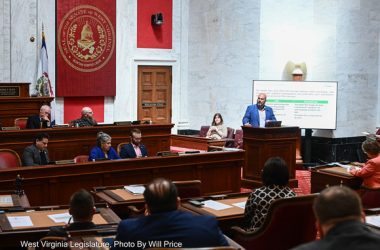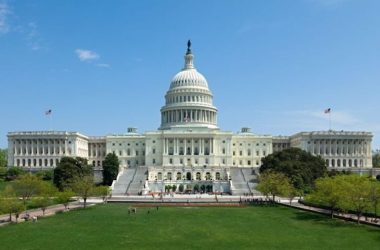West Virginia Press Association Staff Report
CHARLESTON, W.Va. – With the end of the 2024 Legislative Session looming, now just mere hours away, both the House and the Senate are racing toward the finish line, dragging as many bills across it with them as possible.
Members of the Senate entered the Chamber Thursday morning for their first floor session of the day with 25 House bills scheduled for third reading. Senators worked through the majority of the bills with little-to-no conversation. However, this was not the case for all bills on third reading, as a select few generated significant debate. One such bill was HB 5338.
Introduced by Del. Daniel Linville, R-Cabell, HB 5338 relates to “safe harbor for cybersecurity programs” that handle sensitive personnel information, providing that certain protocols are maintained. And while the Senate Finance Committee approved the bill, they proposed an amendment to, as Finance Committee Chair Eric Tarr, R-Putnam, explained, “Clean up language which may otherwise be construed as ambiguous.”
The amendment was approved without debate, however the bill proper was far more contentious.
Senate Minority Leader Mike Woelfel, D-Cabell expressed frustration over the bill having not been first referred to the Judiciary Committee, and shared concerns that the bill would inadvertently grant immunity to medical organizations for HIPAA violations.
Sen. Patricia Rucker, R-Jefferson, also rose in opposition of the bill, saying, “Without having the certainty that the correct language is in place, what I’m worried about is there’s no enforcement.”
“If they have blanket immunity, and there’s nothing to make sure that they have a program to safeguard the information, […] why would they do it?” Rucker added rhetorically.
Sen. Eric Nelson, R-Kanawha, felt differently. According to Nelson, passage of HB 5338 would make West Virginia a “national leader” in cybersecurity.
Ultimately the bill was passed by a vote of 27 to six. Senators Laura Chapman, R-Ohio; Patricia Rucker, R-Jefferson; Mark Hunt, R-Kanawha, Mike Woelfel, D-Cabell; Robert Karnes, R-Randolph; and David Stover, R-Wyoming voted against passage.
Additional House bills passed by the Senate on Thursday include:
- HB 4190: Relating to the establishment of an alert system for missing cognitively impaired persons. Passed 33 to zero.
- HB 4305: Relating to granting in-state resident status to economic development participants. Passed 33 to zero.
- HB 4552: To ensure party affiliation is consistent with candidate’s voter registration. Passed 33 to zero.
- HB 4721: Require Surveyors to offer to record surveys of property. Passed 33 to zero.
- HB 4822: Creating the Certified Sites and Development Readiness Program. Passed 33 to zero.
- HB 4829: Relating to employment of service personnel and removing the requirement for a high school diploma or general education development certificate. Passed 33 to zero.
- HB 4851: To allow for public and private schools in West Virginia to employ security personnel. Passed 33 to zero.
- HB 4867: Require pornography websites to utilize age verification methods to prevent minors from accessing content. Passed 33 to zero.
- HB 4882: Extending in-state tuition rates to all members and veterans of the National Guard, reserves, and armed forces as well as their spouses and dependents. Passed 33 to zero.
- HB 4919: Relating to the Promise Scholarship. Passed 33 to zero.
- HB 4967: Relating to the administration of the Voluntary Remediation and Redevelopment Act to provide new liability protections for persons and companies who wish to purchase and redevelop former industrial properties. Passed 33 to zero.
- HB 5188: Relating to awards and benefits for duty related disability in the municipal police officers and firefighters retirement system. Passed 33 to zero.
- HB 5405: Providing additional professional development and support to West Virginia educators through teacher and leader induction and professional growth. Passed 33 to zero.
- HB 5414: Enhancing training requirements for county boards of education members. Passed 33 to zero.
- HB 5544: Relating to requiring certain reporting from the Mountaineer Trail Network Authority each year. Passed 33 to zero.
- HB 5594: Exempting the West Virginia School of Osteopathic Medicine, West Virginia University and Marshall University from contracts, agreements, or memorandums of understanding with spending units in state government with exceptions. Passed 32 to one, with Rucker voting against.
- HB 5604: Relating to procurement by state spending units. Passed 33 to zero.





